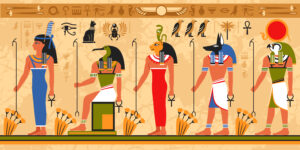“On the first day of the week, when we were gathered together to break bread, Paul began talking to them, intending to leave the next day, and he prolonged his message until midnight. There were many lamps in the upper room where we were gathered together. And there was a young man named Eutychus sitting on the window sill, sinking into a deep sleep; and as Paul kept on talking, he was overcome by sleep and fell down from the third floor and was picked up dead. But Paul went down and fell upon him, and after embracing him, he said, ‘Do not be troubled, for his life is in him.’ When he had gone back up and had broken the bread and eaten, he talked with them a long while until daybreak, and then left. They took away the boy alive, and were greatly comforted” (Acts 20:7-12).
What in the world is the point of this story? Is its purpose to warn believers never to fall asleep during a sermon? Hardly. This brief story carries extraordinary theological weight not just in the book of Acts, but also for a proper appreciation for the epistles of Paul in the New Testament.
First, by means of the keyword “upper room” Luke links Paul’s raising of a boy from the dead to the only “raising of the dead” miracle in Acts: Peter’s raising a woman from the dead who was lying in an upper room (Acts 9:37, 39; 20:8). Second, Luke-Acts relies heavily upon the Elijah-Elisha stories in 1 and 2 Kings as a key paradigm, not only with respect to a unique set of miracles pointing to the Messiah, but also in terms of its model of succession from master (Elijah) to disciple (Elisha). As it just so happens, “upper room” is also a keyword in the only two stories where someone is raised from the dead in the Hebrew Bible: Elijah (1 Kings 17:19-23) and Elisha (2 Kings 4:10-11, 34ff.). And though the word “upper room” does not appear in the story of Yeshua’s raising up of the widow’s son from the dead in Nain (Luke 7:11-35), it likewise shares numerous and strategic parallels to the stories of Elijah and Elisha’s “raising of people from the dead”.
Paul demonstrates himself to be every bit an apostle as Peter and true successor of Yeshua
Putting the pieces together, the point of this story about Paul in Acts 20 is twofold. First, by virtue of this incredibly unique miracle, Luke’s readers must put aside all doubts about the legitimacy of Paul’s apostleship (and it was fiercely debated in the first century). By replicating Peter’s miracle, Paul demonstrates himself to be every bit an apostle as Peter and true successor of Yeshua. Second, Luke’s readers must cast aside any doubts with respect to the spiritual authority vested in all of Yeshua’s apostles. Just as Elisha replicates Elijah’s miracles as proof he was Elijah’s true successor, so Yeshua’s apostles in Acts replicate their Master’s miracles in Luke to prove they are uniquely chosen to carry their Master’s mantle.
And why should any of this matter to us today?
All Paul’s epistles are fully inspired and the completely reliable words of Yeshua to his churches
Because it establishes the unique stamp of divine authority upon the four Gospels as well as all the other books of the New Testament (and Paul’s epistles represent the majority of NT books). Regardless of the fact that Yeshua originally spoke in Hebrew/Aramaic and the Gospels were written in Greek, the four Gospels are tied directly to Yeshua’s divinely chosen apostles. They are, therefore, the fully inspired, completely accurate, and totally reliable representation of Yeshua’s words and deeds. For this reason, there is absolutely no need to back-translate Yeshua’s words from Greek to Hebrew to figure out what Yeshua really means! And regardless of the fact that Paul is not part of the original twelve (the last of whom just so happened to be chosen in an “upper room;” Acts 1:12-26), all Paul’s epistles are fully inspired and the completely reliable words of Yeshua to his churches.
This means we meet the inspired, faithful, and true Yeshua by faithfully and carefully reading the Bible, not by watching every episode of The Chosen (my point is not to criticize this series, but to warn against allowing it to replace, distort, or reshape the presentation of the inspired Jesus in the Gospels).
“So we have the prophetic word made more sure, to which you do well to pay attention as to a lamp shining in a dark place, until the day dawns and the morning star arises in your hearts. But know this first of all, that no prophecy of Scripture is a matter of one’s own interpretation, for no prophecy was ever made by an act of human will, but men moved by the Holy Spirit spoke from God” (2 Pet 1:19-21).










